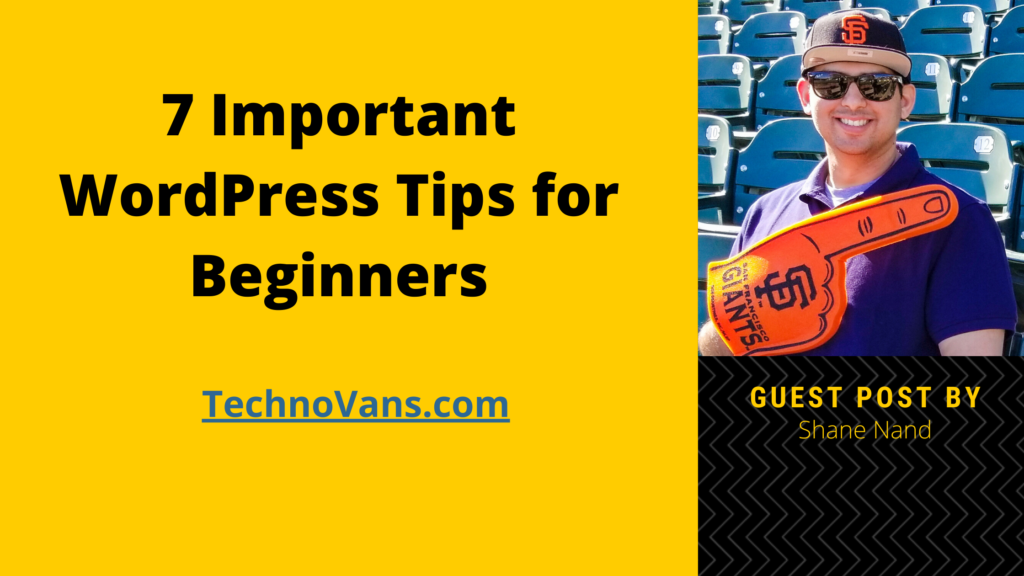7 Important WordPress Tips for Beginners
If you can imagine what your dream website will look like, it can be built on WordPress. Whether you’re a newbie or a seasoned website administrator, the versatility of this content management system is off the charts. There’s a reason why WordPress powers 35% of the web and carries north of 1.1 million new registered domains every six months.
At my day job, I’ve been tasked to create two different websites using WordPress while teaching a technology-challenged colleague the ropes. And despite the popularity, flexibility, and all the magnificent features that WordPress offers, it can be overwhelming for first-timers.
Don’t sweat it! Here are 7 professional WordPress tips to help you get started and avoid common mistakes.

7 Important WordPress Tips for Beginners:
1. Pick a theme and don’t start from scratch
Right off the bat, if you have never created a website, stick to the many, many, premade themes that WordPress offers. Don’t be a hero and create from scratch. You will be devoting a lot of time trying to get the placement of objects and modules into their correct positions, which can be difficult for many reasons including how your website will appear on different devices.
Trust me, there are plenty of beautiful themes where you simply need to replace pictures and text on each page, and you’ll be good to go.
2. Choose the right theme to fit your website
Depending on the purpose of your website, it’s vital to choose the correct theme. There’s an abundance of visually appealing themes out there, but it doesn’t mean they’re all the right choice for the content you’re providing. If you’re a business owner, for instance, don’t go for the minimalist aesthetic that caters to the artistic crowd to showcase their portfolios. You need to display information and lots of it to attract customers. This is especially true if you wish to have transactions on your website. Click here for the best free themes currently available and here for the best premium themes.
3. Plugins… Use sparingly
There’s a lot of plugins–scratch that–there are too many plugins out there. For the sake of your website, use only a handful. Trust the theme that you picked and rely on the features available. I always use Divi for my sites, including the ones at my day job, and the basic features available are pretty adequate for what’s needed. It’s all about how you use these features and their placements, functions, and formatting, which will determine their necessity.
Regardless, there’s no reason to have 100 plugins, and yet I know of people who swear by them until their website crashes. Which brings me to…
4. Use only quality plugins, period.
High installations people! High as a kite! High as in quantity! Forget about rooting for the underdogs here. You are not creating a website on WordPress to test whether or not a plugin works and is reliable in the long term. Questionable plugins can lead to disastrous results—viruses, hacks, page crashes—it’s a flippin’ nightmare.
When you’re adding a new plugin (sparingly remember), please be on the lookout for high installations and also recent updates. That means that the plugin is reputable and is being supported by the developer.
5. Remember these words… BACKUP YOUR WEBSITE!
Please back up your website. I’ve seen crashes and viruses that destroy weeks/months of work in an instant. And then the aftermath: building back the site from scratch.
A backup is crucial to having a website that works properly. If the worst happens, you can easily go back to an earlier version and continue on as normal. But first you have to initiate and complete the backup.
6. When in doubt, call for support
WordPress’s online support is second to none. They are freaky fast with response times and they are with you every step of the way. Whether using forums or paid customer support, you’re in good hands. Here’s a great resource to the different methods of contacting WordPress online support. You’re welcome.
7. Tell people who you are
Putting your face and name out there is something that takes courage. This is always the scary part for newbies, but it’s also a vital part of the website. Showing users who you are and what you’re about can mean the difference between an accidental visit and a fresh subscriber who tells ten of their like-minded friends to visit your site and subscribe as well. About pages are normally the second most visited pages on websites, so after making a good first impression with the homepage, this is where you seal the deal. Let them know who you are and what you’re about so they can fully decide if this is a website worth visiting again.
Author Bio –

Shane Nand is a Bay Area native, where he graduated from San Francisco State University. With a feverish personality, he makes it his mission to win everyone over even if it takes some time. He developed a love for writing at a young age and remains committed to sharpening his craft to create entertaining pieces. He was recently hired as a contributing sportswriter on a brand new website, where he talks about subjects he’s passionate about with a like-minded audience. In addition, he’s currently working on launching his own blog to branch out on other topics besides sports. When Shane’s not writing or working, he’ll probably catch a movie in theaters or go out for a drive on Highway One.
Also Read –
1. 30 Things to do after writing the blog post
2. Important Blogging Tips by Amit Agarwal
3. Tips to Get Google AdSense Approval Within a few Days

These are such important tips! Thank you for sharing!
Amber – The Unpredicted Page
Thank you!
Thanks for this Vanesh, although I cant use plugins as I am not yet using a business plan. On backing up, can you share how to do it? Does it mean saving all your files and blog writeups in a hard drive? Thank you!
I haven’t used WordPress (.com) that much. I am using a WordPress self-hosted blog. But I will try to get more information about it and will let you know.
Thanks!
Hi there Queensights,
There’s generally two ways to do a backup: host and plugin. Depending on which host you’ve chosen for your website, they may already have a backup feature, so take a look at your hosting features or F.A.Q. and see what options they offer. They’ll have step-by-step guides to perform the backup. Each host is different and their processes are different too, so take a look at your specific host’s offering.
The other option is using a plugin. Some of the most popular include Updraft Plus, Vaultpress, Backup Buddy, and BackWPup among others. Some are free and others are premium, so do some research to see what fits your budget and what features you are comfortable with. And honestly, BackWPup is free and it holds up well compared to its premium brethren.
Generally speaking, both types of backups are done via cloud, so no need to use hard drives.
Hope this helps.
Best,
Shane
Thank you so much, Shane.